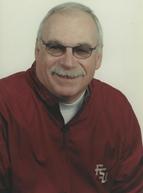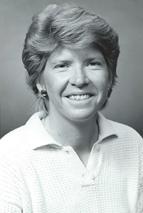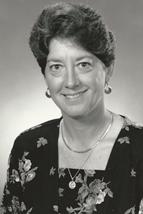
Terry Long
By Kerry Dunning
Spring, 2019
Legends are born from brilliance and tenaciousness, and in part from events often not recognized at the time as game changers. Act by act built a mosaic of national championships, Olympians, all-Americans in women's intercollegiate sports at Florida State University.
 |
Terry Long |
Terry Long can thank his father, FSU coach Mike Long, for the perspective of women's participation in sport. Barbara Palmer came to FSU because of a phone call from her mother saying there was a job posting in the newspaper she should consider. Anne Davis played tennis because courts were built across the street from her childhood home. Cecile Reynaud was a graduate student, too young to get a credit card to rent a car, but still recruited volleyball players to FSU with the help of recruit's parents and a shared telephone.
On a dime, any one of them might not have heard the call leading to the birth of women in intercollegiate sports at Florida State.
"I can remember my dad coaching in the '60s and talking about some of the ladies wanting to use the track," recalled Long.
He set records as an FSU student, and returned to FSU in 1985 to begin his years as the head women's track coach and in 1988 was named coach of the men's and women's teams. His coaching produced 325 graduates, 272 all-conference, 82 all-Americans, and nine Olympians. He can still be found at the track.
"My dad, Dick Roberts, me ... we never lost a championship in the Metro Conference," Long remembered. "We added women and they didn't lose. The ACC was more challenging, but we have made a statement. Look at these teams (2019) that have been ranked No. 1 and 2 in the country. It is really very positive.
Long has seen a lot of changes, from shared locker rooms and equipment rooms between sports to the change from the Metro Conference to ACC. For women's sports, he says the introduction of weight and strengthening programs changed women's sports.
"One of the biggest things was in '84 when the McIntosh funding added 3,000 square feett for weight training. We were able to introduce women recruits into weight training," said Long. "And the coaches did an outstanding job across the board taking athletes to higher levels of competition."
Coaches introduced women to weight training and strengthening, at the same time they addressed concerns about the nature of strengthening.
"They'd say, 'I don't want to get 'muscly' and build up like a guy.' But they could see the bond between strengthening capability and higher levels of competition," Long said. "Across the country, people think of Florida State as a leader."
Funding of women's sports has been a source of pride at Florida State, and at the same time led to ongoing discussions regarding building the programs. Because of the creativity of Barbara Palmer and the working relationship with then athletic director John Bridgers, take any sports analogy - set the bar high, took the three point shot, suicide squeeze - and women's sports have been both leaders and examples of disparity in funding.
Football to the side, since it is recognized as the cog to financial success of all sports on campus, men and women have similar national championship records (men 10, women 9). But more recent success stories are women's softball and soccer "nattys" as well as a beach volleyball national runner-up trophy in 2018.
When Palmer got the prompt from her mother, she headed to the library to read about the AIAW and NCAA history regarding women's sports. The AIAW (Association for Intercollegiate Athletics for Women) launched in 1971 by initiating national championships. It was a huge steppingstone for women's sports, and at its high point the AIAW sponsored 41 national championships in 19 sports. Maybe more importantly, the 1973 basketball tournament made money.
"I went to the library and studied the AIAW and the NCAA. Then they didn't ask me one dadgum question about them," said Palmer. "They wanted to know how I was going to raise dollars and talked about Title IX."
Her first day on the job, she opened a drawer in her desk and found cash. Eventually she found out the money was for a volleyball fundraiser. "I thought this is going to be a real challenge," Palmer said.
Palmer gives credit to Bridgers. "John let me do a lot of innovative things. And I started asking the tough questions."
She started with $163,000 in the budget, and from that put Title IX into action, hired coaches including Cecile Reynaud and JoAnne Graf, and the coaches started putting together the teams. Palmer says much of the motivation for she did came from an early experience watching Reynaud heading for regionals.
"I was saying goodbye and watching them cram women and equipment into a 15-seat van. They put pillows next to where the doors closed so they could fit in more people. They drove to North Carolina, played, and drove back. They ate fast food," said Palmer. "I said never am I going to let this happen again."
 |
Anne Davis |
Davis, the women's tennis coach from 1980-86, was a beneficiary of the groundwork Palmer put in place. Long before that she got her start at public tennis courts. A Metro coach of the year, she compiled a 141-105 record.
"At the time, I was into organized sports in the summer and I loved team sports," she said. But she added that those programs didn't extend into a year round experience. So, she played tennis in college and headed for FSU to coach.
"That time was absolutely fascinating. I was lucky enough to get a job as Florida State was at the forefront of Title IX at the time. You can see it in the success they were having," Davis said.
Two years out of playing at South Florida, she became a graduate coach and then full-time coach. One of best things that may have come out of limited funding and beginning programs was the coaching comraderies. She's not the only coach that talks about a two-story white building on Woodward as a defining moment.
"We were really hard working and enthusiastic," Davis said. "That's where we were sharing information, sharing tears. We were on the phone every night, because this was before social media."
With limited recruiting budgets, Davis said the phone - talking to the player, the coach, the parents had to be decision maker in who they chose to come to FSU. Talking it over with others in the same situation led to some pretty good teams for the Seminoles.
"Looking back, I was very lucky to land where I did," Davis said. "I was very lucky to be an observer and to be a part of a historic time period."
 |
Cecile Reynaud |
Reynaud has observed, coached and voiced women's sports at Florida State even past retirement. Playing volleyball at Missouri State, a person there knew Billie Jones (a softball and volleyball coach at FSU). Reynaud, with introduction made, came to Tallahassee as a master's student and a coach paid $3,000.
Reynaud may know the inside of Tully Gym better than anyone at Florida State. She spent 26 years as the volleyball coach. She is on a short list of coaches with more than 600 wins, with her teams garnering six Metro championships and one ACC title.
"We practiced at Montgomery, but we played at Tully, with no air conditioning," said Reynaud. At that time eight coaches shared an office - and one phone - in 204 Tully. "We even had to practice at the same time the men's basketball team, so they backed up into our practice."
One keen desire of Reynaud is an upgraded Tully or a dedicated space for women's volleyball. She began her career, ended her career, and now supports volleyball in the same building. At the same time, it holds the memories of long time relationships, and even an AIAW final.
Any discussion today regarding funding for women's sports has a beginning. And that was a program with no recruiting budget. She really did have to be creative on any of her limited recruiting trips.
"I wasn't old enough to have a credit card or even able to rent a car," reflects Reynaud. That's when a recruit's parents, in Baltimore, got her a car.
And the story Palmer tells about the 15 passenger van, Reynaud added, "We even had two blowouts in one day."
A turning point for Reynaud, and others working with the fledgling women's programs, was interacting with Bobby Bowden at head coaches' meetings. He may have never had to recruit to Tully, but he had to recruit to a program that had seen some of its worst seasons. Not only did she listen, but she learned to talk about money for the program. Reynaud even put together a wish list.
Lucy McDaniel listened. "I talked about wanting to do a two-week trip in Europe, and Lucy gave the money for the trip."
McDaniel would also leave $1 million in her estate designated for volleyball. McDaniel stated a desire to inspire other women to donate funds to women's sports.
The celebration of the 50th year of women's intercollegiate sports has been highlighted by some of the most successful teams in FSU history. This year is also the time of beginnings revisited. The opportunity for future growth and success knows unbound limits. It began on the backs and minds and spirt of these, and many others, believing in the programs at Florida State.
 |
Head Volleyball Coach Chris Poole, Donor Janet Stoner, Former Women's Swimming and Tarpon Club Coach Alicia Crew, Senior Associate Athletics Director Vanessa Fuchs, Former Women's Athletic Director Barbara Palmer, Former Softball and Volleyball Coach Dr. Billie Jones, Former Softball Coach Dr. Joanne Graf, Former Volleyball Coach Dr. Cecile Reynaud, Former Women's Swimming Coach Terry Maul, Columnist Kerry Dunning |
A February, 2019 gathering of pioneers of women's intercollegiate sports at Florida State provided an oral history on the evolution to today's consistently highly ranked women's teams. The panel featured Dr. JoAnne Graf, Dr. Billie Jones, Terry Maul, Barbara Palmer and Dr. Cecile Reynaud. It can be viewed on Seminoles.com.